The CAS Inquire program builds around a college-wide series of public lectures centering on a new theme each year. A touchstone for the college, the talks give students, staff, and faculty a focal point and shared topic for conversations and further inquiry.
The 2022-2023 Theme
Searching for Common Ground in a Polarized World
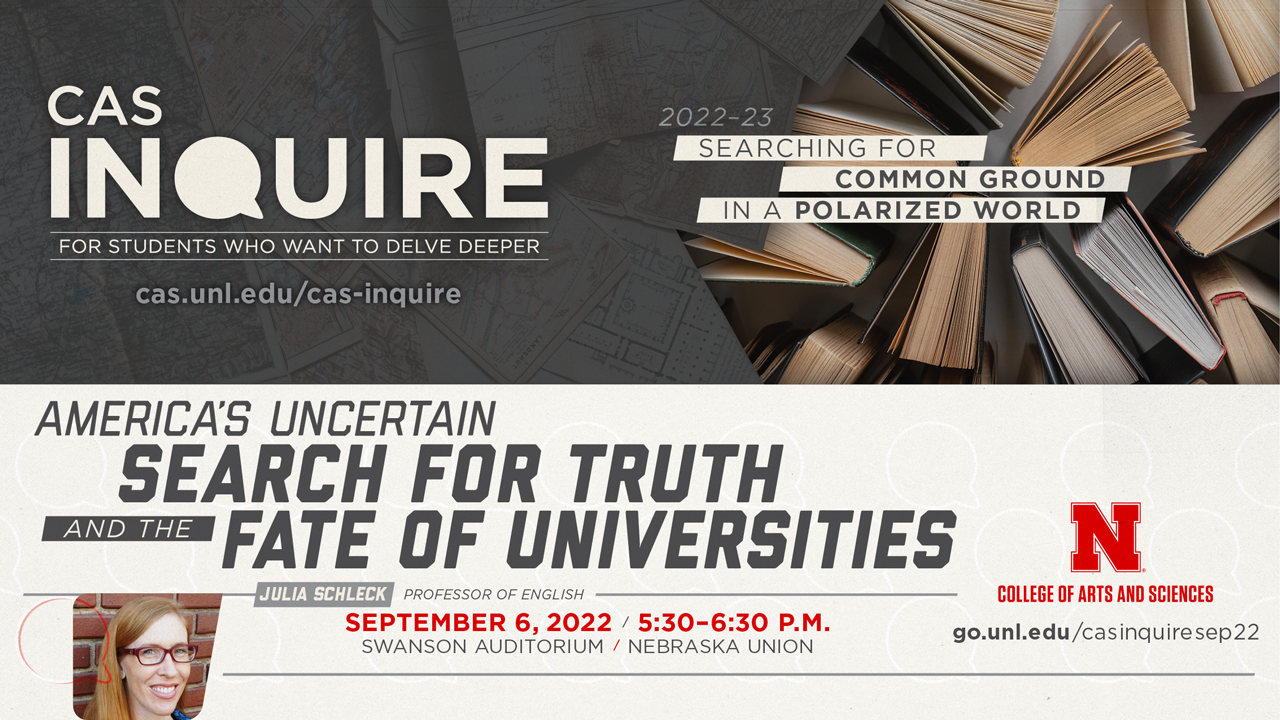
“America’s uncertain search for truth and the fate of universities”
What role do American universities play in a society growing increasingly uncertain how to reach agreement on the truth about anything? This lecture will discuss the changing function of higher education in relation to contemporary disagreements over the point of an education and the worth of expert knowledge in decision-making.
Julia Schleck, associate professor in the Department of English, will discuss the differences between legally protected free speech and the tradition of academic freedom within United States universities, describing in some depth how the latter was designed to work and how it was gradually adopted across the course of the twentieth century. She will discuss the rights and responsibilities of both professors and students in promoting academic freedom on our campus, giving students a basic grounding in the philosophical premises governing most of their classes. Schleck will also explain in detail how academic freedom was designed to protect a certain vision of higher education’s role in our society, predicated on respect for academic expertise and based in a notion of public service often described as “the common good”. The modern challenge to that vision posed by neoliberalism will form the primary inquiry posed to students through this lecture: what role do they believe universities should play in our country’s future?
The current challenges to the common good vision of higher education are twofold. The first of these is economic and ties to the radical defunding of “the commons” more broadly in contemporary US society. The second links to the insistent individualism of neoliberalism, which has contributed to the current crisis of authority impeding the forming of consensus in the US.
In addition to a widespread mistrust of government, our society is now marked by a deep skepticism towards intellectual and academic authorities. The common good vision of higher education was predicated upon a deep faith in the idea that intellectual expertise would assist US society to progress: scientifically, technically, politically, artistically, and morally. In short, academic achievement was the trusted path to the country’s collective success. This stands in stark contrast to current popular rhetoric, in which it is precisely these experts who have caused the country to fall from a prior greatness and who help to inflict suffering on the population.
Drawing on the work of historians of science such as Stephen Shapin (A Social History of Truth), Schleck will highlight the loss of consensus around intellectual authority, considering seriously the objections as well as the defenses of academic expertise and looping back around to challenge students with questions about their own vision for the role played by academic expertise, and the institutions which foster it, in our society’s future.
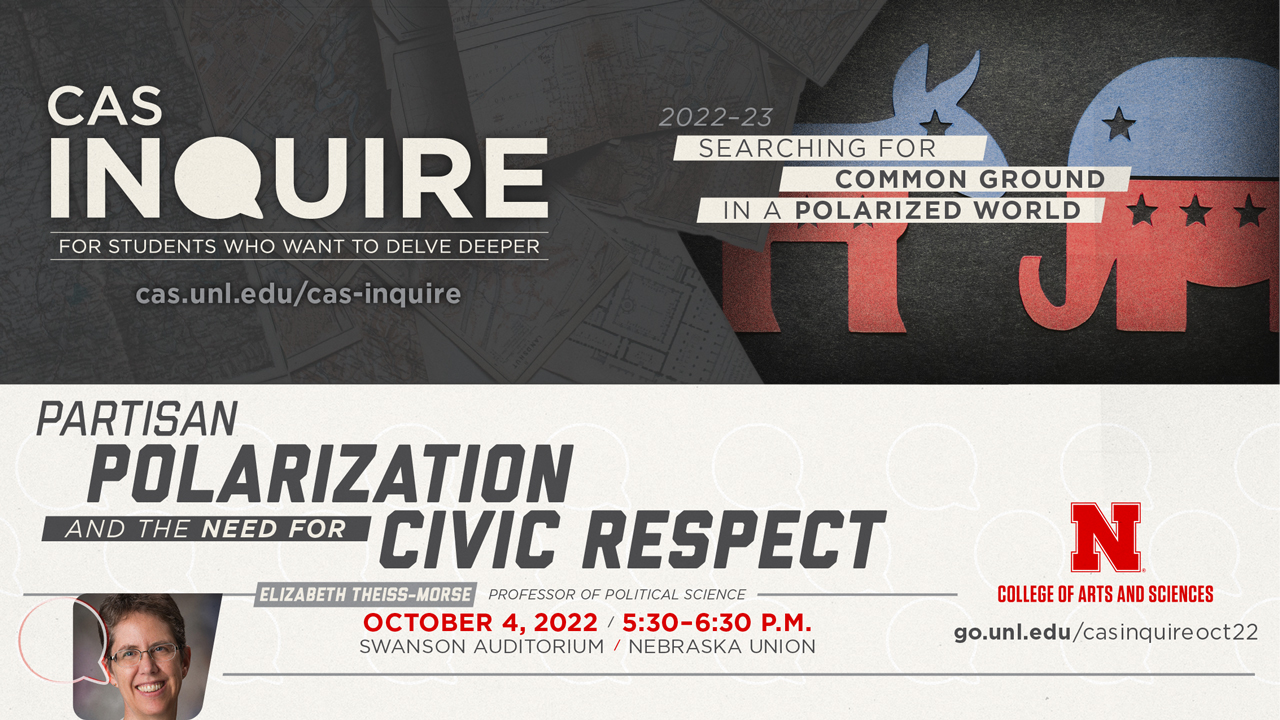
“Partisan polarization and the need for civic respect”
Respect is a cardinal virtue of democratic citizenship, yet while most Americans say they believe in civic respect, they do not practice this respect. Giving people civic respect means engaging with the other side’s ideas, rather than simply assuming political opponents are ignorant or stereotyping them based on their vote. At its core, civic respect is about accepting pluralism.
We live in a time when partisan polarization is worse even than it was during the Civil War. Many people would not want their child to marry someone from the opposing party, and partisans discriminate in favor of hiring someone from their party even when the out-party applicant has stronger credentials. Elizabeth Theiss-Morse, Willa Cather Professor in the Department of Political Science, and fellow political scientist Jeff Spinner-Halev argue for the idea of respect as a way to get around this polarization. Respect is considered a cardinal virtue of democratic citizenship, even more central than tolerance, yet it is a virtue that many people fail to achieve.
Theiss-Morse will focus in this talk on what we call civic respect, which means being willing to listen to and engage with people with whom one disagrees. Giving people civic respect means engaging with the other side’s ideas, rather than simply assuming political opponents are ignorant or stereotyping them based on their vote. We find that most citizens say they believe in civic respect but have a hard time practicing respect when it comes to opposing partisans. At its core, civic respect is about accepting pluralism. Americans believe in a multiparty democracy, but they do not want the other party to ever win an election and can think of only pejorative reasons for why someone would vote for the opposing party’s candidate. If opposing partisans were better educated or less ignorant or less misled by the media, many of us believe, they would vote (and presumably think) like us.
The reality is that people identify with and vote for candidates from the opposing party for many different reasons, including basic ideological differences and the fact that Americans live in a two-party system in which two big umbrella parties vie for power. Through focus groups, surveys, and an experiment, Theiss-Morse and Spinner-Halev examine the factors that explain why some are able to give civic respect while many are not. Theiss-Morse will draw on these data to show why people have such a hard time giving opposing partisans civic respect and to argue for the importance of accepting pluralism in liberal democratic societies.
We will never agree with each other, but we don’t have to assume the worst of opposing partisans. If we are willing to listen to and engage with the opposing side’s ideas, we might be able to find that elusive “common ground.”
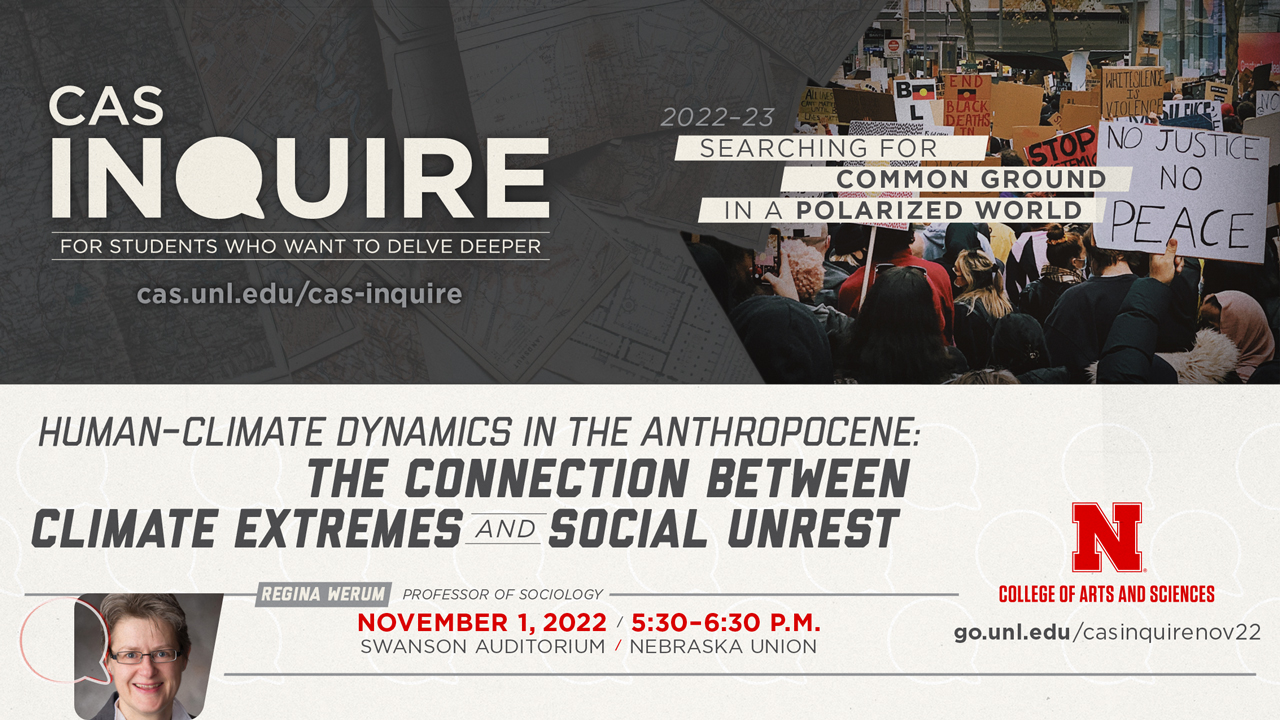
“Human-climate dynamics in the Anthropocene: the connection between climate extremes and social unrest”
Climate change is not just about extreme weather events and disasters. The domino effect it creates has existential implications for people around the world, because it drives migration waves (“climate refugees”), competition over resources (food, water, shelter), public health threats, and even political instability.
Regina Werum, professor in the Department of Sociology, will introduce the audience to fundamental social science concepts that help explain how both climate-based and social conditions can affect protests, while using climate and computer science tools to illustrate these dynamics in India and neighboring countries.
Social scientists often use the metaphor of a “polarized world” to describe political tensions between groups, countries, regions. But in literal and figurative ways, both our natural and social worlds are indeed polarized, with demonstrable effects on climate conditions as well as people’s quality of life. Over the past decades, the link between extreme weather patterns related to climate change and its impact on people around the world has become more apparent than ever before. Read the news on any given day, and see the same regions experiencing climatological crises also experiencing political and demographic crises. Especially conflicts over water – too much, too little, and the wrong kind – have been associated with political instability and protests. For instance, sustained droughts in Western Asia (from Lebanon over Syria to Iran) and Eastern Africa (Sudan, Ethiopia, Yemen), just like rising seawater levels elsewhere, have been linked to political instabilities, even civil and international wars.
So where’s the potential for common ground? Local governments and international organizations have found common ground in the recognition that these political instabilities create massive population changes that place further stress on adjacent regions and countries. These massive population changes include (1) internal, largely involuntary migration to already densely populated areas, as well as to rural areas accommodating internally displaced persons (IDPs); (2) international involuntary migration (refugees); (3) erosion of quality-of-life standards (e.g., rising maternal/infant mortality). This combination of down-stream effects further accelerates the vortex of destabilization that affects both the natural world of resources and the social world we inhabit. It also has played a role in recent efforts to systematically address both the causes and the symptoms of social unrest in ways that hit countries and people in this polarized world (pun intended).
Overall, the goal of Werum's talk will be to introduce the audience to some foundational concepts in the social sciences (cause and correlation, unintended consequences) and to provide interesting graphics based in empirical data to illustrate these concepts. In the process, she will find a way to highlight current case studies that illustrate the connections between social and environmental (especially water-related) dynamics. She will also try to pique the students’ interest by bringing in evidence from one of her own research projects in this area. It is a collaboration with computer scientists and climate scientists on protest dynamics in India and neighboring countries that has provided significant training experiences for undergraduate and graduate students, with funding from the U.S. Department of Defense. The related activities (panel, Q&A etc.) will focus on identifying specific, contextualized solutions grounded in grassroots-based civic engagement and policy-based approaches.
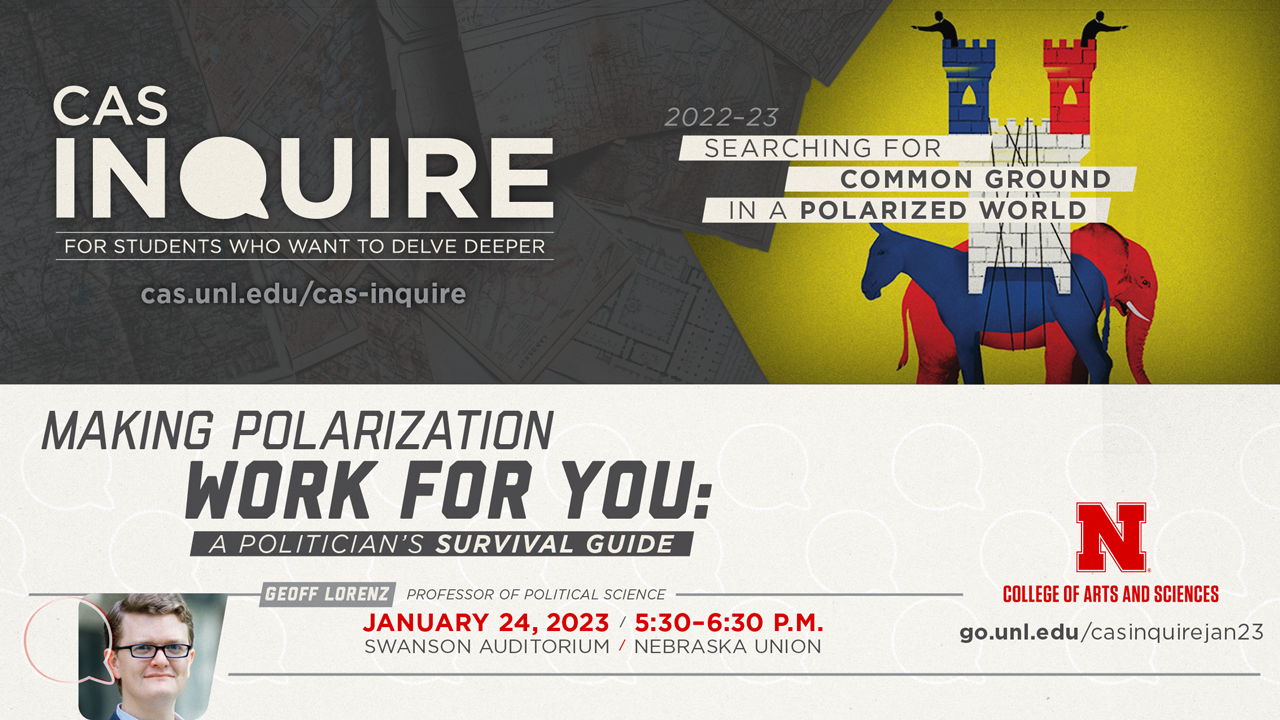
“Making polarization work for you: a politician’s survival guide”
No one confronts the consequences of contemporary partisan polarization more than the country’s elected officials and the lobbyists who try to influence them.
Geoff Lorenz, assistant professor in the Department of Political Science, will examine the strategies these political elites use to survive and thrive, and sometimes even govern effectively, in an era of partisan polarization. Along the way, the audience will learn how political scientists get reliable data about actors whose job depends on their ability to spin, sell, and self-promote.
Polarization and partisan conflict pervade contemporary American political culture. Lorenz's lecture will draw on the political science of American political institutions to examine how interactions between the mass public, political elites, and organized special interest groups contribute to this status quo, and how "policy entrepreneurs" such as individual legislators, advocacy groups, and lobbyists navigate these conditions to change policy on behalf of their constituencies, communities, and clients.
Such entrepreneurs have adopted three broad strategies to remain effective in the current era of partisan polarization. Some join the partisan fray, taking to Twitter and other platforms in an effort to raise their personal profile, especially among partisan activist groups. Many of Congress's newest and youngest members, who would be "seen but not heard" in earlier eras, have quickly become some of their party's most prominent voices and most effective fundraisers. In doing so, they leapfrog up traditional party hierarchies, wield outsize influence, and bring ideas that were recently unthinkable into the national conversation. A second set of entrepreneurs operate at the margins of traditional coalitions, creating a competitive faction out of groups alienated by the other party or simply not previously involved in politics at all. The relationship between former President Trump and police unions illustrates how the ability to activate an organized but unaligned constituency can allow a marginal actor to change the partisan game. The final set of entrepreneurs forge coalitions of diverse and often bipartisan bedfellows to advance bills through the legislative process and into law.
Even, perhaps especially, in a polarized partisan era, the ability to appeal to diverse interests and forge broad coalitions is often necessary for even the most partisan actors to actually change policy. Why do some elites become partisan while others transcend or avoid partisan affiliations? Do we expect these trends to continue? And what would happen if the era of partisan warfare somehow ended tomorrow?
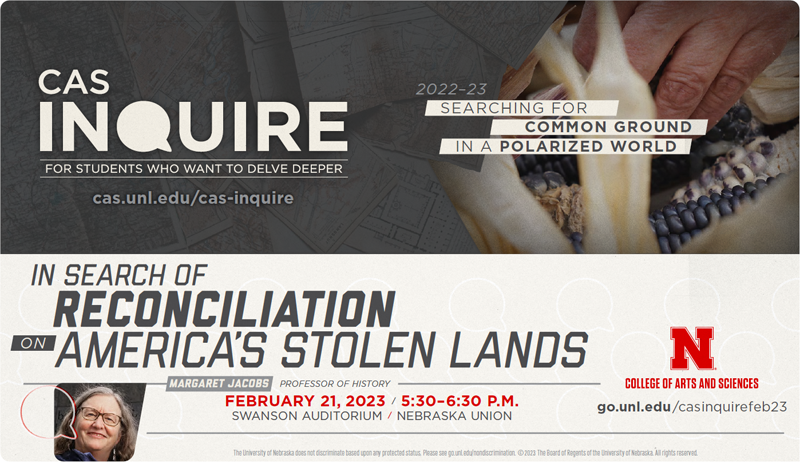
“In search of reconciliation on America’s stolen lands”
It is a truism that we live in a deeply polarized time and that white supremacy is gaining strength worldwide. Margaret Jacobs, Charles Mach Professor in the Department of History and director of the Center for Great Plains Studies, will explore a quiet but powerful counter current that flows just beneath the jagged surface of our divisive times.
Many Americans long to face up to the painful truths of our histories. They have a hunger for healing and reconciliation and are taking part in a rising social movement to reckon with and make amends for our haunted past. Jacobs' presentation focuses on Indigenous people and settlers who are working together to grapple with and overcome histories of violent dispossession.
Her talk is based on her recently published book, After One Hundred Winters: In Search of Reconciliation on America’s Stolen Lands and on the Reconciliation Rising multimedia project she co-directs with local Lakota journalist Kevin Abourezk. Jacobs draw on interviews with remarkable individuals, both Indigenous and non-Indigenous, throughout the United States, Australia, New Zealand, and Canada, who are confronting the painful pasts of their nations, seeking reconciliation, and reimagining new partnerships between settlers and Indigenous people. Some of these people are working at the grassroots, literally. Deb Echo-Hawk, a member of the Pawnee nation of Oklahoma, is partnering with Ronnie O’Brien, a white settler in Nebraska, to revive Pawnee corn in the original homelands of the Pawnee people.
Others are pursuing truth and reconciliation within the highest levels of government. Mick Dodson is an Aboriginal Australian, who co-chaired his nation’s Stolen Generations Inquiry, then led efforts to negotiate a treaty between the federal government and Aboriginal peoples of the Northern Territory. In common, these visionaries are seeking to recover and face up to our long-buried histories. They are also making history themselves by refusing to follow the old paths of conflict and division. They are taking risks and moving out of their comfort zones to forge relationships based on mutual care and reciprocity.
Jacobs' presentation ponders how settlers in the United States can support Indigenous aspirations and pursue truth and reconciliation after more than a century of government policies that dispossessed and impoverished Indigenous peoples.